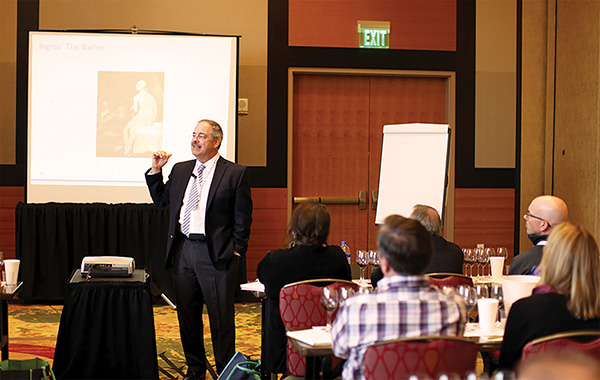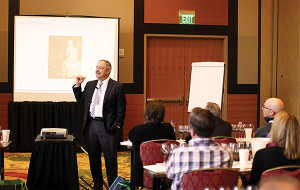
BY EDWARD KORRY CHE, CSS, CWE

Ed Korry giving a seminar on quality assessment at the Society Wine Educators’ (SWE) Annual Conference on August 13, 2014 in Seattle.
Arguably, many of those in the beverage industry are members of an industry career not requiring them to be certified as professionals. Every other profession in this country requires some kind of certification or licensing to be able to work. Professions denote careers for people requiring specific skill sets to be able to perform those jobs effectively. This article will try to clarify why it is so vital for those in the beverage industry to have the knowledge that their customers can and do attain, and to validate that knowledge with certifications — whether you are in supply, distribution, sales or education and training.
Certifications demonstrate commitment to the fascinating and endlessly diverse world we deal with, as well as afford the satisfaction of being perceived as a professional, and most importantly, provide you with the tools to be more successful. Besides, what message is being sent to the public when so many of us either fear or cannot be bothered to test our knowledge in a formal manner? One further point, which is critical to those of you already in the industry, young people value certifications and want as many as they can attain because employers recognize the benefits of hiring certified professionals.
The food and beverage industry has changed so much in the past twenty years, from when I was a food and beverage manager making beverage purchasing decisions. There are so many more products available, with more coming into the marketplace every day, and customers are much more sophisticated. Knowledge is power, and without it business owners and managers are not able to make the best decisions for their company, which in one way or another, involves sales.
Twenty years ago, there was little in the way of certification choices and little beverage knowledge available to those entering either culinary or hospitality programs. Once I became a faculty member at Johnson & Wales University, I realized that huge opportunities existed for both myself and future generations of students. I have since attained both WSET and SWE certifications, and devoted my career to driving the creation of Sommelier and Beverage Service Management minors with plans for a degree program.
Twenty years ago, there were three credible programs available: the English-based Wine & Spirits Education Trust®, the start of the American chapter of the Court of Master Sommelier Guild and the Society of Wine Educators (SWE). Two of the three dominant certification systems available worldwide are English-based. They both evolved in the 1970’s because England was the center of the wine world, and that remained true until just this past year when the U.S. took over the position of the world’s most important wine market.
The WSET® was developed to train and certify those working primarily in the retail off-premise and distribution system. It also was created to enable candidates to prepare themselves for that most rigorous of wine related designations, the Master of Wine. It has evolved to follow a national vocational qualifying system in accordance with the British Ministry of Education and the EU policies. The WSET continues to play the dominant role worldwide for wine education, although the landscape is changing.
The Court of Master Sommeliers created the Master Sommelier certification without providing much in the way of tools to enable those to pass the rigorous exam. It was in this country that a U.S. chapter was formed to enable a multi-tiered certifying process enabling select candidates to reach the qualifying level of Master Sommelier. This process didn’t exist in the UK, but made eminent sense and has proved to be significant in how the wine world perceives the level of wine education here in the U.S.
The other major certifying body is the U.S.-based, Society of Wine Educators (SWE), which was formed at the University of California at Davis in 1977, about the same time as WSET and the Court. The SWE also reflects the U.S. market in a way that its competitors do not. The WSET has greater focus on the wines of Chile than on the U.S., as an example. The mission at that time was to test educators as to their wine knowledge by passing the Certified Wine Educator (CWE) exams. As with both the Master of Wine (MW) and the Master Sommelier (MS) programs, there was little in the way of educational support for potential candidates other than a yearly conference that continues to this day.
The SWE, which is more value driven, took a significant step a decade ago, in creating intermediate steps for those who want to have their knowledge certified as a Beverage Specialist at the foundational level and developing more advanced programs to become a Certified Specialist of Wine (CSW) and the Certified Specialist of Spirits (CSS). These titles convey a significant level of knowledge attainment without mastering all that is available. SWE also supplies candidates with comprehensive study guides, which undergo revision every two years, and workbooks with over 1,700 questions.
The guide is also available as an eBook. There are also interactive webinars to support candidates’ studies and a free app to download on iPhones – SWE wine and spirits quiz with over 5,000 questions and links to information for many of the answers – with an Android version to be released next year. SWE’s website also has an online academy of wine and spirits that is accessible with membership.
There is also an informative blog: www.winewitandwisdomswe.com. Lastly, to accommodate the busy schedule of those already in the trade, SWE exams are available at over 5,000 Pearson Vue test sites located close to any candidate. This allows the tester to receive results and get analytics immediately upon finishing the exam. The SWE, whose tagline is ‘enhancing Spirits & Wine Education worldwide’, enables accessibility anywhere, worldwide.
Spirits has become a major industry focus and the only other competing organization for certification of spirits is the United States Bartenders’ Guild (USBG). This program is directed toward bartenders. Taking the SWE spirits course would certainly enhance a candidate’s ability to pass the knowledge component of USBG Advanced Bartender Certification. In just five short years, there are almost 3,000 Certified Specialist of Spirits. Beer-related certification, such as the Cicerone®, is a topic for another issue that will be presented in a future column.
Bottom line: today’s beverage industry employees have run out of excuses not to become more successful professionals. Cheers!
Ed Korry is an Associate Professor and Department Chairman of Beverage & Dining Service at Johnson & Wales University, Providence. He is also serving as President of the SWE and has attained both its and WSET certifications. Johnson & Wales University offers courses to assist in certification exam preparation. RI, MA and CT beverage professionals should visit the site.



